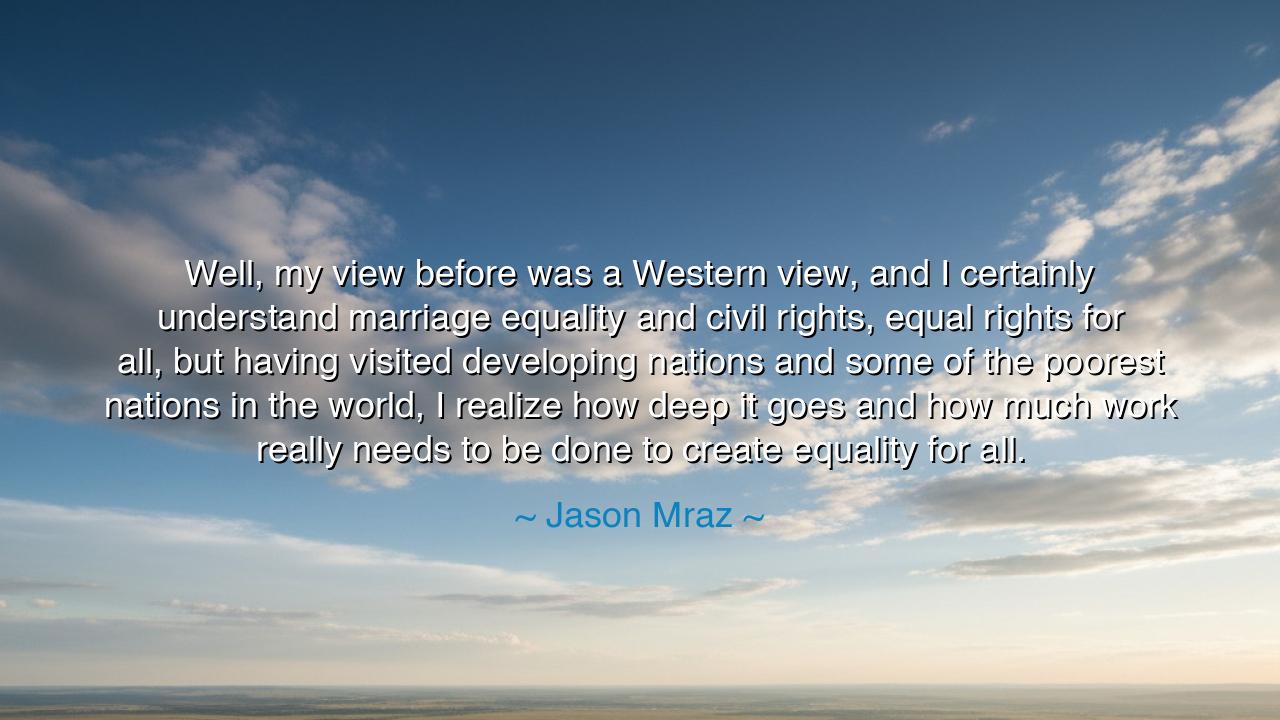
Well, my view before was a Western view, and I certainly
Well, my view before was a Western view, and I certainly understand marriage equality and civil rights, equal rights for all, but having visited developing nations and some of the poorest nations in the world, I realize how deep it goes and how much work really needs to be done to create equality for all.






When Jason Mraz said, “Well, my view before was a Western view, and I certainly understand marriage equality and civil rights, equal rights for all, but having visited developing nations and some of the poorest nations in the world, I realize how deep it goes and how much work really needs to be done to create equality for all,” he was confessing a transformation — the awakening of a soul that has seen beyond the borders of comfort. His words are not the boast of enlightenment, but the humble realization of how vast and complex true equality truly is. For Mraz, like many who grow up within privilege, the idea of equality once seemed clear and complete — a matter of laws, rights, and tolerance. But upon traveling through lands burdened by poverty and struggle, he saw that justice is not a single horizon, but a thousand hills yet to climb.
The origin of these words lies in Mraz’s journey as both artist and humanitarian. Known first for his music — bright, hopeful, and filled with messages of love — he began to expand his vision of love beyond romance and melody, toward service and global empathy. His travels through developing nations exposed him to a reality unseen by most in the Western world: that equality is not achieved by words alone, nor guaranteed by modern laws. It must reach beyond politics into the daily survival of those who hunger, labor, and live unseen by the privileged eye. Thus his quote carries the wisdom of awakening — the moment when compassion sheds its innocence and becomes responsibility.
In the ancient sense, Mraz’s realization mirrors that of a philosopher who steps out of the city walls and discovers that the truth he once believed was only a shadow of the greater truth beyond. To speak of marriage equality or civil rights within an advanced society is noble, but to see the faces of those for whom survival itself is a battle — that is to understand that equality cannot exist where the basic dignity of life is denied. It is one thing to legislate fairness, another to cultivate it across a world divided by wealth, war, and history. Mraz’s words remind us that privilege narrows vision, and that true wisdom begins when one dares to look beyond it.
Consider the story of Eleanor Roosevelt, who once lived in the insulated world of privilege, unaware of the depth of suffering around her. It was only after she walked through the slums of Depression-era America, after she met the hungry, the jobless, and the forgotten, that her heart began to change. She became a voice for human rights, not because she studied equality in theory, but because she saw its absence in flesh and bone. Like Mraz, she learned that compassion without understanding is sentiment, but compassion born of experience becomes a force for justice. Her work in shaping the Universal Declaration of Human Rights was the fruit of that awakening — proof that empathy, when deepened by awareness, can change the course of history.
Mraz’s insight that “it goes deep” speaks to the layers of inequality that exist within humanity. In the poorest corners of the world, oppression takes many forms — hunger, illiteracy, gender violence, the degradation of labor, the exploitation of the earth itself. To speak of equality without addressing these roots is to treat the symptoms, not the disease. His words call us to broaden our definition of justice — not merely as equal rights under law, but as equal access to life’s fullness: food, education, healthcare, dignity, and hope. Equality, in his redefined vision, becomes not an abstract ideal but a daily act of restoration.
There is in his statement a quiet heroism — the courage to admit one’s former blindness. Many speak of equality as though it were already achieved in their own lands, yet Mraz recognizes that moral awakening requires humility. It is easy to celebrate progress from a distance; harder to face the suffering that still festers beneath civilization’s surface. His journey is the modern pilgrimage — not to a sacred temple, but to the truth that humanity’s wounds are one, and that no people are truly free until all can stand as equals.
And so, let this teaching endure for those who seek to live with open hearts: do not mistake comfort for completion. Equality is not a finished monument, but a road that must be walked again and again, each generation clearing its stones for the next. If you wish to change the world, step beyond your own walls. Travel, listen, learn — and let your compassion be sharpened by what you see. For as Jason Mraz discovered, to love humanity is not to idealize it, but to serve it — to face its pain, to uplift its forgotten, and to labor, tirelessly and humbly, until the light of equality reaches even the darkest corners of the earth.






AAdministratorAdministrator
Welcome, honored guests. Please leave a comment, we will respond soon